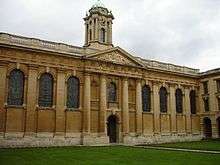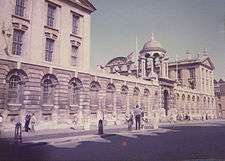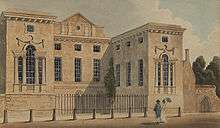George Clarke
| George Clarke | |
|---|---|
%2C_studio_of_Godfrey_Kneller.jpg) George Clarke (1661-1736) (Studio of Godfrey Kneller) | |
| Secretary at War | |
|
In office 1690–1704 | |
| Monarch | William III |
| Preceded by | William Blathwayt |
| Succeeded by | Henry St John |
George Clarke (7 May 1661 – 22 October 1736),[1] was an English architect, Tory politician and print collector.
The son of Sir William Clarke, he enrolled at Brasenose College, Oxford in 1676. He was elected a Fellow of All Souls College, Oxford in 1680. He became Judge Advocate to the Army and was Secretary at War in Ireland from 1690 to 1692 and in England from 1693 to 1704 under William III of England and Queen Anne. He served as secretary to Prince George of Denmark, Queen Anne's consort and the Lord High Admiral and Generalissimo of England.[1]
He was successively Member of Parliament for Winchelsea from 1702 to 1705, coinciding with his office as Joint Secretary of the Admiralty, East Looe from 1705 to 1708, and Launceston from 1711 to 1713. Over the latter period he was Lord Commissioner of the Admiralty from 20 December 1710 until 14 October 1714, when he was dismissed following the accession of George I. He returned to the House of Commons, in a by-election, as MP for Oxford University in 1717, serving until his death, although at the time of his last election in 1734 he had lost his left eye and was losing sight in the other.[1]
He was also an amateur architect.[2] His known work is largely confined to Oxford, (Clayton's DNB entry for Clarke offers more detail of his architectural endeavours) and he is known to have designed buildings and also to have collaborated with Nicholas Hawksmoor, amongst others.
Timothy Clayton discusses Clarke’s print collection, noting “John Vanburgh, Alexander Pope and George Vertue travelled to Oxford to use his library with its unique collection of notes and drawings by [Inigo] Jones” (Clayton 1992, p. 124).
The library of Worcester College, Oxford houses Clarke's collection of books, MSS, prints and drawings. Building work on the library, which was started within a few years of the college's founding in 1714, was completed in 1736. A spat between Clarke and All Souls resulted in the bequest to Worcester.
List of architectural works
The library in the Peckwater Quad, Christ Church, Oxford (1717–38)
Rebuilt The Queen's College, Oxford, with Hawksmoor (1710–21)
The New Buildings, Magdalen College, Oxford (1733)
The Hall, Chapel and Library, Worcester College, Oxford (1733–1753)
The Rectory, Kingston Bagpuize (c.1723)
Cokethorpe House, alterations (c.1710)
Gallery of architectural work
 The Library, Christ Church, Oxford
The Library, Christ Church, Oxford%2C_Christ_Church%2C_Oxford_-_geograph.org.uk_-_187942.jpg) The rear of The Library, Christ Church, Oxford
The rear of The Library, Christ Church, Oxford Quad, The Queens' College Oxford
Quad, The Queens' College Oxford Quad, The Queens' College Oxford
Quad, The Queens' College Oxford High Street front, The Queens' College Oxford
High Street front, The Queens' College Oxford Magdalen College, Oxford, New Buildings in the background
Magdalen College, Oxford, New Buildings in the background Front, Worcester College, Oxford
Front, Worcester College, Oxford- Quad, Worcester College, Oxford
References
Clayton, T. (1992) “The Print Collection of George Clarke at Worcester College, Oxford”. Print Quarterly 9(2) 123–141.
George Clarke Print Collection
Leigh Rayment's Historical List of MPs
http://www.historyofparliamentonline.org/volume/1715-1754/member/clarke-george-1661-1736
Further reading
Clayton, T. (1997) The English Print 1688–1802. Yale University Press. London.
Clayton, T. (2004) "Clarke, George (1661–1736)". Oxford Dictionary of National Biography. Oxford University Press, 2004. Online edition. DOI: http://www.oxforddnb.com/view/article/5496
| Parliament of England | ||
|---|---|---|
| Preceded by John Hayes Robert Austen |
Member of Parliament for Winchelsea 1702–1705 With: James Hayes |
Succeeded by George Dodington James Hayes |
| Preceded by Sir John Pole, Bt Sir Henry Seymour, Bt |
Member of Parliament for East Looe 1705–1707 With: Sir Henry Seymour, Bt |
Succeeded by Parliament of Great Britain |
| Parliament of Great Britain | ||
| Preceded by Parliament of England |
Member of Parliament for East Looe 1707–1708 With: Sir Henry Seymour, Bt |
Succeeded by Harry Trelawny Sir Henry Seymour, Bt |
| Preceded by Lord Hyde Francis Scobell |
Member of Parliament for Launceston 1711–1713 With: Francis Scobell |
Succeeded by Edward Herle John Anstis |
| Preceded by Sir William Whitelock William Bromley |
Member of Parliament for Oxford University 1717–1736 With: William Bromley 1717–1732 Viscount Cornbury 1732–1736 |
Succeeded by Viscount Cornbury William Bromley |